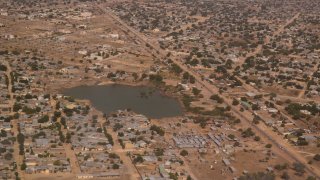
Date: Sunday, 03 March 2024

Like the past string of coups in Western and Central Africa, the latest one in Chad tests Western commitments and values.
Over the night of February 28, 2024, a confusing and violent coup unfolded in the North-Central African nation of Chad.
Following an announcement concerning the timetable of upcoming presidential elections, the headquarters of Chad’s intelligence agency was attacked. This attack was sparked after a deputy leader of the opposition Socialist Party Without Borders (PSF) was arrested. The resulting street battles in the capital ultimately resulted in the leader of the PSF, Yaya Dillo Djerou, dying after the government’s Republican Guard stormed PSF headquarters. Dillo had only one day earlier ominously told the French Press Agency people wanted to “physically eliminate him.”
Dillo’s statement proved to be accurate, but one need not be a prophet to arrive at his conclusion. In 2021, the then President of Chad, Idriss Déby Itno, died in combat while supervising attacks against a rebel group in Northern Chad dubbed the Front for Change and Concord in Chad (FACT). He had come to power after a coup in 1990, the latest in a long line of leaders taking power via unconstitutional methods since independence from France in 1960.
Idriss Déby Itno’s son, Mahamat Idriss Déby, followed in his father’s footsteps, immediately establishing a new military junta, dissolving parliament, and suspending the constitution while promising a speedy transition to democracy. Complicating the family drama, Dillo was related to both Débys, had previously been a trusted minister, had his house raided by the authorities in 2021, resulting in the death of his mother, and had recently attracted Mahamat Idriss Déby’s uncle into joining the opposition PSF.
The PSF is not the only opposition party in Chad, and much of the rest of the opposition (speaking on the condition of anonymity) fear they will be “swept away after this mess,” with this bout of instability providing the needed pretext. Many in Chad simply believe that the recent violence was provoked by the government, especially as the announcement for elections disincentivizes the opposition from acting extra-constitutionally.
This convoluted conflict, whose facts are not established at the time of writing, has resulted in Mahamat Idriss Déby sweeping aside his most powerful adversary and scattering the rest of the opposition. He is now set to handily win the upcoming presidential elections, just like his father did six times before. This is the definition of a specific type of coup, the self-coup (dubbed autogolpe in academic literature), where the head of state seizes more power from within the state apparatus.
This coup puts the United States and the West, especially France, in an awkward position. Chad has been a vital security partner in a volatile region, helping fight Islamic jihadists in the Sahel and containing instability emanating from neighboring Libya and Sudan. These close relations go back to the Toyota War of the late 1980s, in which Chad, with French support, contained Libyan dictator Muammar Gaddafi’s territorial ambitions. As the former colonial power, France maintains close relations with Chad and is helping to develop Chad’s nascent oil industry. The United States also generously supports Chad through military assistance, training, and a host of USAID programs.
This close relationship between Chad and the West naturally made it a magnet for Russian interference. Russia’s infamous late Yevgeny Prigozhin had told mercenaries of the Wagner Group to “prepare for Africa.” Even before this declaration and continuing after his death, Russian influence has abetted instability in the Central African Republic, Sudan, Niger, Mali, and Burkina Faso.
Russia and Chad have had a checkered relationship. In April 2023, leaked documents showed that Russia was attempting to establish training bases in the neighboring Central African Republic in an “evolving plot to topple the Chadian government.” Chad was subsequently one of the countries to snub Russia during the July 2023 Russia-Africa summit. When the coup in neighboring Niger occurred, which also had Russian fingerprints on it, Mahamat Idriss Déby traveled to Niger to meet with the ousted President and attempt mediation. Only months later, in January 2024, Mahamat Idriss Déby went to Moscow to speak with Putin.
Before the coup, Chad bordered two Russia-friendly states (the Central African Republic and Niger) and another in which Russian influence aided in inducing anarchy (Sudan). The coup itself has put the West in an unenviable position. Regardless of the chain of events surrounding the self-coup, who supports what actor or faction, and to what extent, Russia benefits the most from Chad’s instability since it reduces Chad’s value as a pro-Western regional partner.
We could ignore the excesses of the Chadian government and maintain support for the government in the name of geopolitical expedience, in which case the Russian strategy of seeking to paint democracy as meaningless and hypocritical is vindicated. The West could also choose to condemn the coup and play into the hands of Russia’s destabilizing strategy by undermining an already fragile state and opening it to Russian influence. Threading the needle between both would be difficult but not impossible.
While there are no good responses to this crisis, it can serve as a lesson. The United States and the West are the defenders of the international system and benefit from generalized peace and stability. Regardless of who it is induced by, instability is anathema not just to basic humanitarian principles but to American interests. The United States needs to take a more proactive role in confronting Russian agents of instability and more dynamically use foreign aid and financing institutions to counter these actions. Every time we fail to act, we confront the same headlines in the region. History is now repeating not just as a tragedy but as an avoidable farce.
*Wesley Alexander Hill is Lead Analyst and International Program Manager at the International Tax and Investment Center’s Energy, Growth, and Security Program. He is a China and Africa expert.